2022届高考英语二轮复习:特殊句式课件(44张)
文档属性
| 名称 | 2022届高考英语二轮复习:特殊句式课件(44张) | 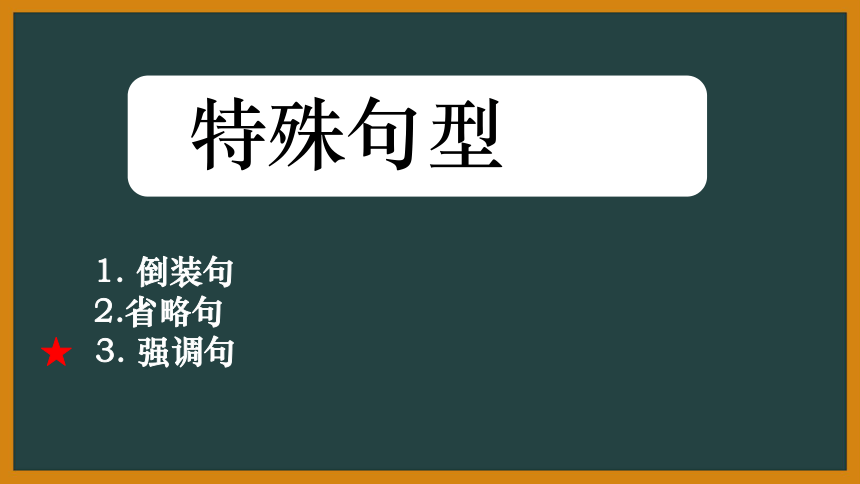 | |
| 格式 | pptx | ||
| 文件大小 | 1.4MB | ||
| 资源类型 | 教案 | ||
| 版本资源 | 通用版 | ||
| 科目 | 英语 | ||
| 更新时间 | 2022-04-12 16:41:37 | ||
图片预览

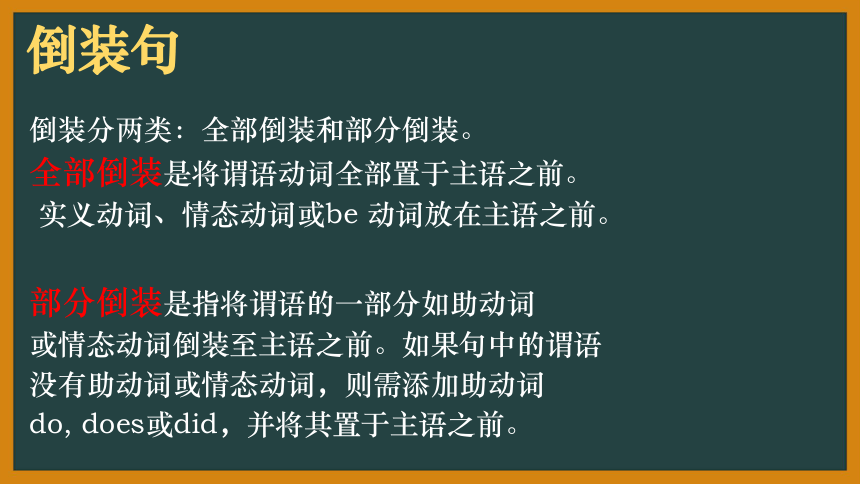
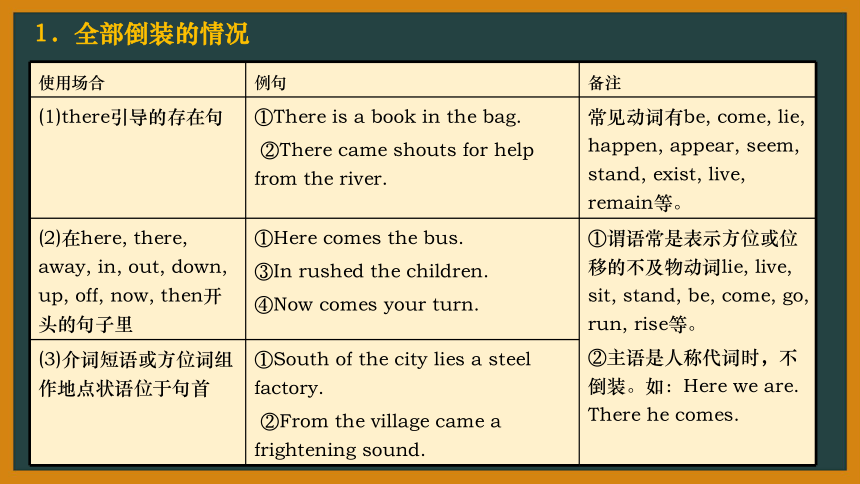
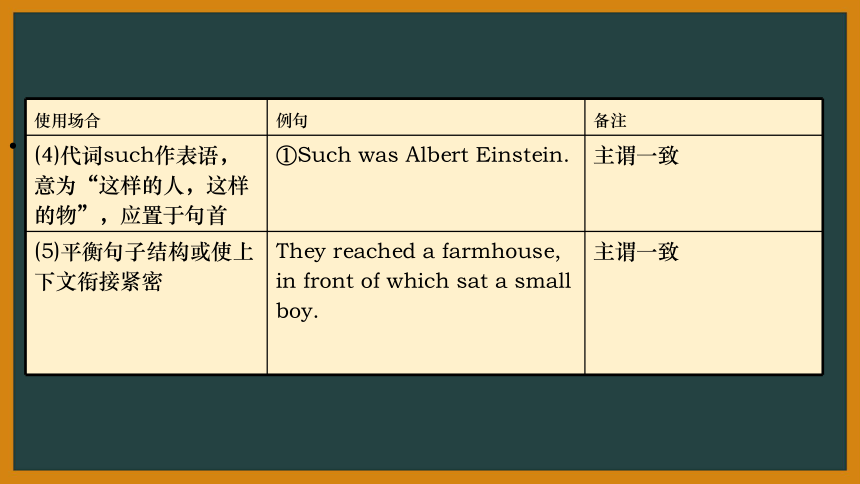
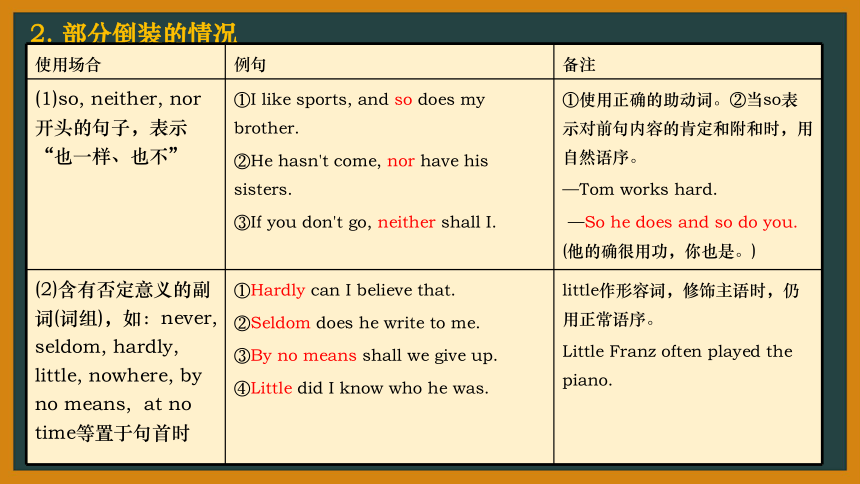
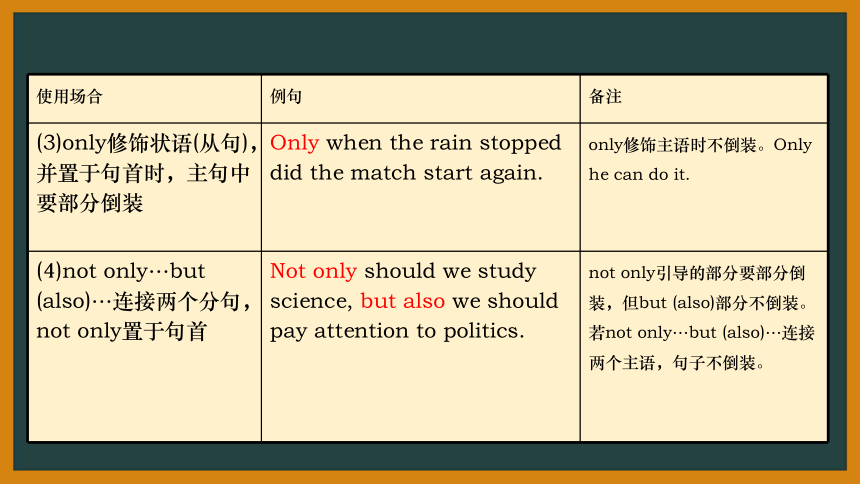
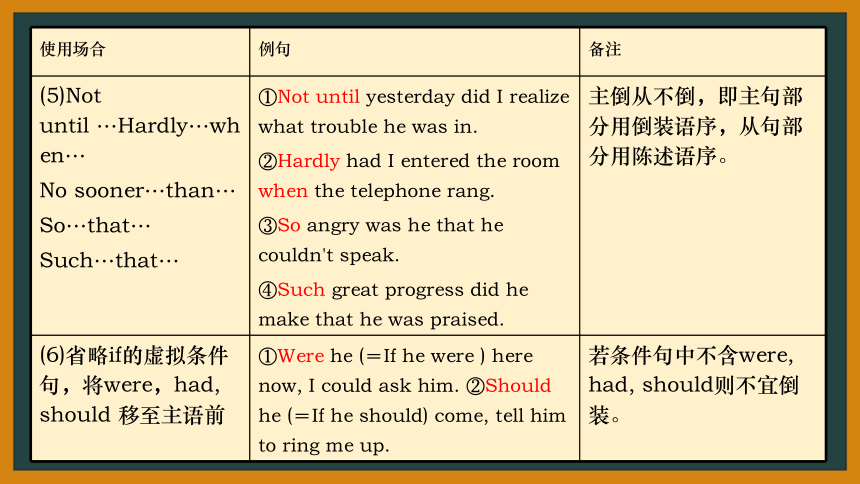
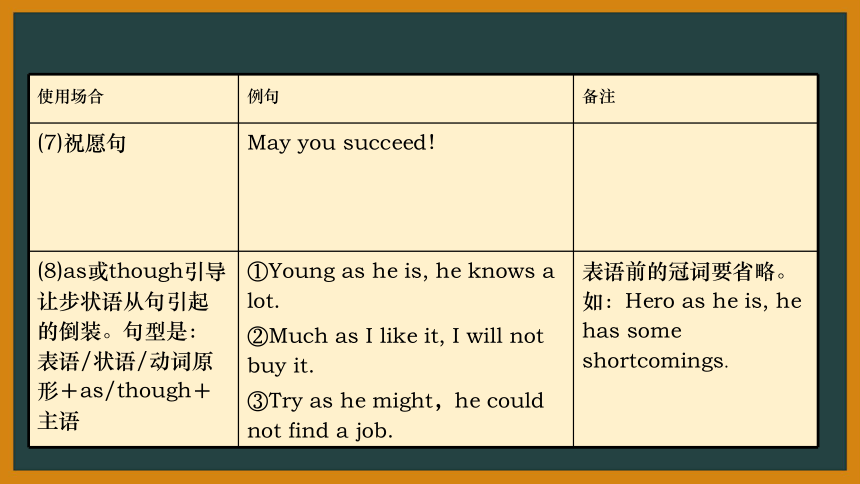
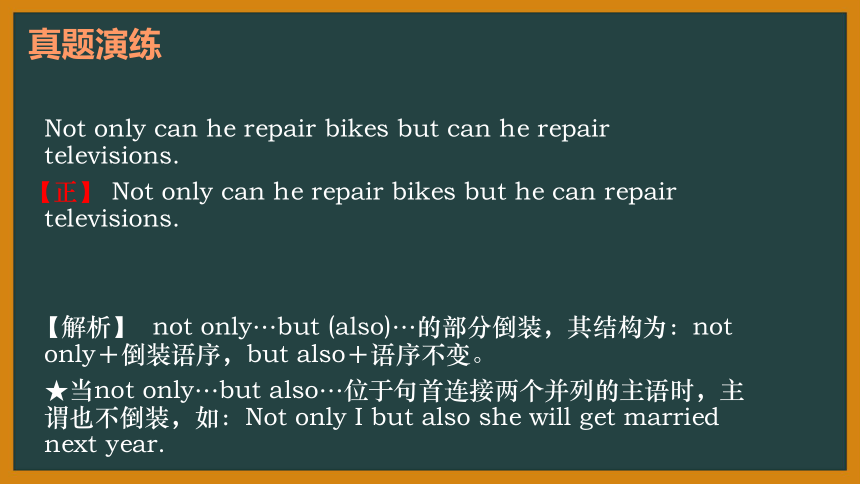

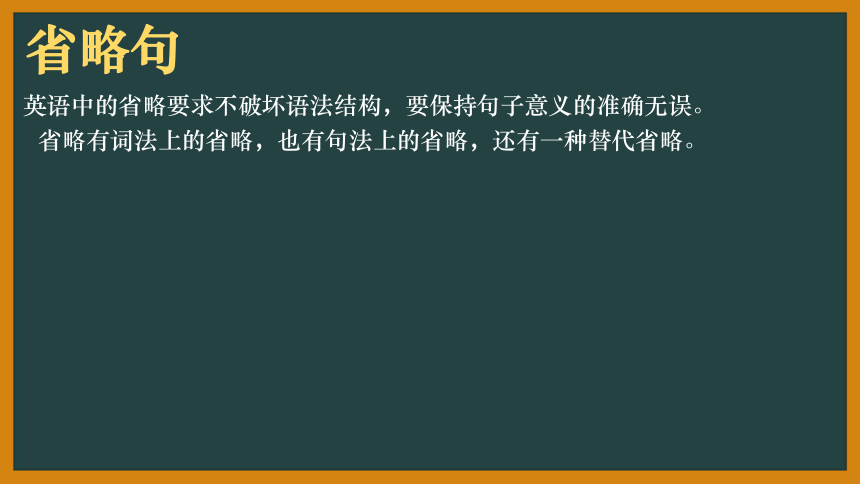
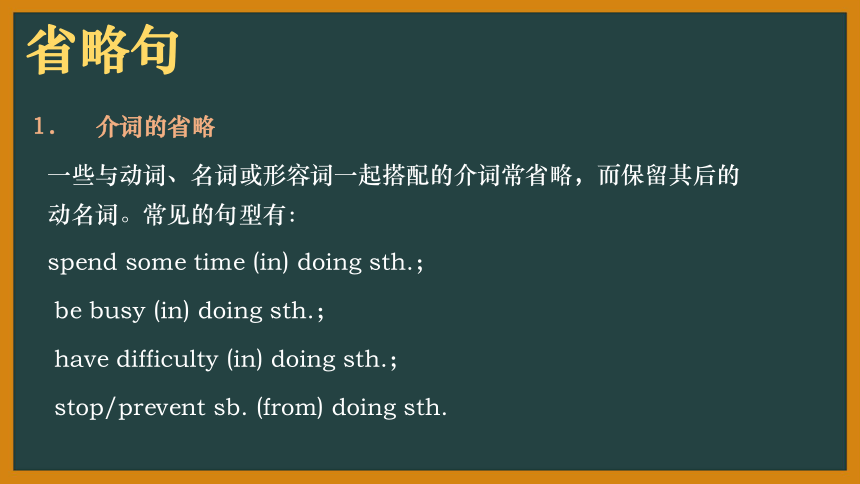
文档简介
(共44张PPT)
特殊句型
1. 倒装句
2.省略句
★ 3. 强调句
倒装分两类:全部倒装和部分倒装。
全部倒装是将谓语动词全部置于主语之前。
实义动词、情态动词或be 动词放在主语之前。
部分倒装是指将谓语的一部分如助动词
或情态动词倒装至主语之前。如果句中的谓语
没有助动词或情态动词,则需添加助动词
do, does或did,并将其置于主语之前。
倒装句
1.全部倒装的情况
使用场合 例句 备注
(1)there引导的存在句 ①There is a book in the bag. ②There came shouts for help from the river. 常见动词有be, come, lie, happen, appear, seem, stand, exist, live, remain等。
(2)在here, there, away, in, out, down, up, off, now, then开头的句子里 ①Here comes the bus. ③In rushed the children. ④Now comes your turn. ①谓语常是表示方位或位移的不及物动词lie, live, sit, stand, be, come, go, run, rise等。
②主语是人称代词时,不倒装。如:Here we are. There he comes.
(3)介词短语或方位词组作地点状语位于句首 ①South of the city lies a steel factory. ②From the village came a frightening sound.
使用场合 例句 备注
(4)代词such作表语,意为“这样的人,这样的物”,应置于句首 ①Such was Albert Einstein. 主谓一致
(5)平衡句子结构或使上下文衔接紧密 They reached a farmhouse, in front of which sat a small boy. 主谓一致
2. 部分倒装的情况
使用场合 例句 备注
(1)so, neither, nor开头的句子,表示“也一样、也不” ①I like sports, and so does my brother. ②He hasn't come, nor have his sisters. ③If you don't go, neither shall I. ①使用正确的助动词。②当so表示对前句内容的肯定和附和时,用自然语序。
—Tom works hard.
—So he does and so do you. (他的确很用功,你也是。)
(2)含有否定意义的副词(词组),如:never, seldom, hardly, little, nowhere, by no means, at no time等置于句首时 ①Hardly can I believe that. ②Seldom does he write to me. ③By no means shall we give up. ④Little did I know who he was. little作形容词,修饰主语时,仍用正常语序。
Little Franz often played the piano.
使用场合 例句 备注
(3)only修饰状语(从句),并置于句首时,主句中要部分倒装 Only when the rain stopped did the match start again. only修饰主语时不倒装。Only he can do it.
(4)not only…but (also)…连接两个分句,not only置于句首 Not only should we study science, but also we should pay attention to politics. not only引导的部分要部分倒装,但but (also)部分不倒装。若not only…but (also)…连接两个主语,句子不倒装。
使用场合 例句 备注
(5)Not until …Hardly…when… No sooner…than… So…that… Such…that… ①Not until yesterday did I realize what trouble he was in. ②Hardly had I entered the room when the telephone rang. ③So angry was he that he couldn't speak. ④Such great progress did he make that he was praised. 主倒从不倒,即主句部分用倒装语序,从句部分用陈述语序。
(6)省略if的虚拟条件句,将were,had, should 移至主语前 ①Were he (=If he were ) here now, I could ask him. ②Should he (=If he should) come, tell him to ring me up. 若条件句中不含were, had, should则不宜倒装。
使用场合 例句 备注
(7)祝愿句 May you succeed!
(8)as或though引导让步状语从句引起的倒装。句型是:表语/状语/动词原形+as/though+主语 ①Young as he is, he knows a lot. ②Much as I like it, I will not buy it. ③Try as he might,he could not find a job. 表语前的冠词要省略。如:Hero as he is, he has some shortcomings.
Not only can he repair bikes but can he repair televisions.
【正】 Not only can he repair bikes but he can repair televisions.
【解析】 not only…but (also)…的部分倒装,其结构为:not only+倒装语序,but also+语序不变。
★当not only…but also…位于句首连接两个并列的主语时,主谓也不倒装,如:Not only I but also she will get married next year.
真题演练
A child as/though he is, he is very brave.
【正】 Child as/though he is, he is very brave.
【解析】 由as/though引导的表示“虽然,尽管”的让步状语从句用倒装语序,把从句的表语或状语等放在as/though的前面,但是如果从句中的表语是名词,其名词前不加任何冠词。
真题演练
英语中的省略要求不破坏语法结构,要保持句子意义的准确无误。
省略有词法上的省略,也有句法上的省略,还有一种替代省略。
省略句
1. 介词的省略
一些与动词、名词或形容词一起搭配的介词常省略,而保留其后的动名词。常见的句型有:
spend some time (in) doing sth.;
be busy (in) doing sth.;
have difficulty (in) doing sth.;
stop/prevent sb. (from) doing sth.
省略句
2. 连词that 的省略
I believe (that) he will come here.
It's a pity (that) he will leave this city.
省略句
3. 定语从句与名词性从句中的省略
①在限制性定语从句中,作宾语用的关系代词whom, which, that可省略。
The teacher (who/whom/that) I talked with was Mr. Meng.
②在与suggest, request, order, advise等词相关的名词性从句中,应用虚拟语气形式“should +动词原形”,should可以省略。
She suggests that we (should) go at once.
省略句
4.动词不定式省略,只保留to的场合。
不定式作某些动词的宾语时,常见的动词有expect, refuse, mean, like, love, hope,want等。如:
He went home that day though he didn't want to.
省略句
—Are you and Jane getting married?
—We hope.
【正】 —Are you and Jane getting married?
—We hope to.
【解析】 动词不定式在like, love, care, want, hope, expect, prefer, refuse, decide, mean, intend, try, promise等动词后作宾语时,为了避免重复,常承前省略不定式后的内容,但要保留不定式符号to。
真题演练
I came not to scold but praise you.
【正】 I came not to scold but to praise you.
【解析】 在并列结构中为了避免重复,后一个to常省略,但两个不定式有对照或对比的意义时,则后一个to不能省略。
真题演练
He is rather difficult to make friends with,but the friendship of his,________,is truer than any other.
A.once gained B.when to gain
C.after gained D.while gaining
【解析】 A 这是once it is gained的省略,句意为:……但是一旦获得了和他的友谊,要比其他人的要真诚得多。
真题演练
I met Li Ming at the railway station yesterday.
强调主语:
It was I that (who) met Li Ming at the railway station yesterday.
强调宾语:
It was Li Ming that I met at the railway station yesterday.
强调地点状语:
It was at the railway station that I met Li Ming yesterday.
强调时间状语:
It was yesterday that I met Li Ming at the railway station.
强调句
无论被强调的是人﹑物﹑时间﹑地点还是方式一律用that, 只有强调人时也可用who。
1、陈述句的强调句型:It is/ was + 被强调部分(通常是主语、宾语或状语)+ that/ who(当强调主语且主语指人)+ 其它部分。
It was yesterday that he met Li Ping.
It was him that I met yesterday.
2、一般疑问句的强调句型:同上,只是把is/ was提到it前面。
Was it yesterday that he met Li Ping
3、特殊疑问句的强调句型:被强调部分(通常是疑问代词或疑问副词)+ is/ was + it + that/ who + 其它部分?
When and where was it that you were born
强调句
注意:
①构成强调句的it本身没有词义;
②强调句中的连接词一般只用that, who,即使在强调时间状语和地点状语时也如此,that, who不可省略;
③强调句中的时态只用两种,一般现在时和一般过去时。
原句谓语动词是一般过去时、过去完成时和过去进行时,用It was … ,其余的时态用It is … 。
强调句
not … until … 句型的强调句
1、句型为:It is/ was not until + 被强调部分 + that + 其它部分
普通句:He didn’t go to bed until/ till his wife came back.
强调句:It was not until his wife came back that he went to bed.
注意:此句型只用until,不用till。但如果不是强调句型,till, until可通用;因为句型中It is/ was not … 已经是否定句了,that后面的从句要用肯定句,切勿再用否定句了。
强调句
谓语动词的强调
1、It is/ was … that … 结构不能强调谓语,如果需要强调谓语时,
用助动词do/ does或did。
Do sit down. 务必请坐。
He did write to you last week.
上周他确实给你写了信。
Do be careful when you cross the street.
过马路时,务必(千万)要小心啊!
★注意:此种强调只用do/ does和did ,没有别的形式;
过去时用did ,后面的谓语动词用原形。
强调句
It was to save the child _____he got drowned. (2005.35)
A. as B. that C. when D. while
【翻译】为了救一个孩子他溺死了。
他溺死是为了救一个孩子。
【解析】答案B。本题考查强调句型。
强调句型的基本结构是:it is/was that ...
需要强调的部分放在is/was的后面,
被强调的部分可以是名词、副词、介词短语或从句。
本题强调的是一个表示目的的不定式短语。
真题演练
Thank you!
1. 陈述部分含有must的反意疑问句
当must作“必须”讲时,其反意疑问部分用needn't;
当含有mustn't(不允许、禁止)时,其反意疑问部分用must;
当must表示推测,作“一定,准是”讲时,反意疑问部分的动词形式根据must后面的动词形式确定。如:
You must go now, needn't you
你现在必须走,是不是?
You mustn't smoke here, must you
你不能在这里吸烟,是吧?
You must have watched that football match last night, didn't you 你昨晚一定是看足球比赛了, 是吧?
反义疑问句
2. 陈述部分含有used to的反意疑问句
陈述部分含有used to时,其反意疑问部分用usedn't或didn't均可。如:
You used to play football, usedn't/didn't you
你过去常常踢足球,是吗?
3. 陈述部分含有ought to的反意疑问句
其反意疑问部分用oughtn't或shouldn't均可。如:
He ought to attend the meeting, oughtn't/shouldn't he
他应该参加会议,是不是?
反义疑问句
4. 否定词或半否定词的反意疑问句
当陈述部分带有seldom, hardly, scarcely, never, few, little, nothing, nobody等否定词或半否定词时,疑问部分的动词用肯定形式。如:
He could hardly get up, could he
他几乎起不来了,是不是?
5. 陈述部分含有表示“否定”意义的前缀构成的词,其反意疑问部分一般用否定式。如:
Mary dislikes sports, doesn't she
玛丽不喜欢体育运动,不是吗?
反义疑问句
6. 含有宾语从句的反意疑问句
当陈述部分带有宾语从句时,疑问部分的主语应和主句的主语保持一致。但当主句是:I think,I believe, I suppose, I expect, I imagine等结构时,疑问部分的主语和谓语动词均应和宾语从句的主语和谓语保持一致。如:
He said that he would come here on time, didn't he
I don't think he will come here on time, will he
反义疑问句
7. 祈使句的反意疑问句
祈使句后加附加问句,不表示反意,而表示一种语气。其结构为:否定祈使句,+will you
肯定祈使句,+ will/won't you Let's…, + shall we Let us…, + will you?如:
Open the door, will you
Let's go out for a walk, shall we
Let us go to school, will you
注意:
(1) 反意疑问句的回答
不要看汉语如何翻译,只看所提到的事情是否发生。如果发生了,用肯定回答,否则用否定回答。如:当对方问你“You aren't a teacher, are you?”或“You are a teacher, aren't you?”时,如果你是老师,回答“Yes, I am. ”否则,回答“No, I am not. ”
(2) 反意疑问句的主语和陈述部分的主语在人称、数上需要注意的几种情况
反义疑问句
陈述部分主语 反意疑问部分主语 疑问部分谓语的数 例句
this, that it 单数 This is a bike,isn't it?
these, those they 复数 These are not your books, are they?
everything, anything, something, nothing it 单数 Nothing has happened, has it?
注意
陈述部分主语 反意疑问部分主语 疑问部分谓语的数 例句
everyone, everybody, someone, somebody, no one, anybody, anyone, anybody, none, neither he或they(更常见) 单数或复数 Nobody likes to be laughed at, does he/do they?
不定式、动名词、主语从句、其他短语 it 单数 Learning English well takes a lot of time, doesn't it?
there be句型 there 单数或复数 ①There is no doubt about it, is there?
②There will be rain tomorrow, won't there?
Not until quite recently ________ that language is closely related to culture.
A.he realized B.did he realize
C.had he realized D.he did realize
【解析】 B not until引导的短语置于句首,后面要用部分倒装结构,所以要排除A和D;此外,句子中没有明显的“过去的过去”标志词,所以不能用过去完成时,故C项也得排除。
Casey, ________ to the classroom and see who it is there.
A.going B.go C.to go D.gone
【解析】 B 该题带有吩咐口吻,且Casey为呼语,因此题干应为祈使句,即以动词原形开头。
真题演练
I don't suppose anyone will be willing to do the hard job, ________?
A.do I B.don't I
C.will they D.won't they
【解析】 C I think/suppose/believe引导的宾语从句的反意疑问句,存在否定转移的习惯,且反意疑问句的主语应与从句主语一致,选C。
真题演练
At the meeting place of the Yangtze River and the Jialing River ________,one of the ten largest cities in China.
A.lies Chongqing
B.Chongqing lies
C.does lie Chongqing
D.does Chongqing lie
【解析】 A 考查倒装句。为了表示强调,把作状语的介词短语提到句首,此时句子采用完全倒装的语序。
真题演练
Go straight into the cave and find out what's in it, ________?
A.can't you B.don't you C.are you D.will you
【解析】 D 考查反意疑问句。这是一个祈使句,对祈使句构成反意疑问句用will you
We laugh at jokes,but seldom ________ about how they work.
A.we think B.think we
C.we do think D.do we think
【解析】 D 考查倒装用法。seldom,hardly,never,no等具有否定意义的词位于句首句子用部分倒装语序。
真题演练
—I've read three books this week.
—Well, maybe ________ is not how much you read but what you read that counts.
A.this B.that C.there D.it
【解析】 D 考查强调句型的用法。把“________ is”和句中的that省略后,该句话依旧成立,由此可知该题是强调句型的结构,所以答案只能用it。
真题演练
________in the root of his family that he decided to make a trip to Africa for further research.
A.So interested Kunta was
B.So interested was Kunta
C.How interested Kunta was
D.Kunta was such interested
【解析】 B 考查倒装句。so…that这个固定句式中的so及其修饰成分提到句首时,句子倒装,因此B项正确。
真题演练
If you have a job,________ yourself to it and finally you'll succeed.
A.do devote B.don't devote
C.devoting D.not devoting
【解析】 A 考查祈使句用法。If引导从句,所以此处应该填入可以构成主句的词,这里是祈使句,do表示强调。
真题演练
________for the worst in advance and you won't be disappointed.
A.Prepare B.When preparing
C.Having prepared D.If you prepare
【解析】 A 祈使句和and连用相当于条件状语从句的用法。原句=If you prepare for the worst in advance,you won't be disappointed.
真题演练
15.—He has to finish the experiment today. He must be in the lab,________?
—That's quite possible.
A.mustn't he B.won't he
C.doesn't he D.isn't he
【解析】 D 该题考查反意疑问句。must be结构中的中心词应为be,且He must be in the lab相当于I think he is in the lab,故应用isn't he。
真题演练
特殊句型
1. 倒装句
2.省略句
★ 3. 强调句
倒装分两类:全部倒装和部分倒装。
全部倒装是将谓语动词全部置于主语之前。
实义动词、情态动词或be 动词放在主语之前。
部分倒装是指将谓语的一部分如助动词
或情态动词倒装至主语之前。如果句中的谓语
没有助动词或情态动词,则需添加助动词
do, does或did,并将其置于主语之前。
倒装句
1.全部倒装的情况
使用场合 例句 备注
(1)there引导的存在句 ①There is a book in the bag. ②There came shouts for help from the river. 常见动词有be, come, lie, happen, appear, seem, stand, exist, live, remain等。
(2)在here, there, away, in, out, down, up, off, now, then开头的句子里 ①Here comes the bus. ③In rushed the children. ④Now comes your turn. ①谓语常是表示方位或位移的不及物动词lie, live, sit, stand, be, come, go, run, rise等。
②主语是人称代词时,不倒装。如:Here we are. There he comes.
(3)介词短语或方位词组作地点状语位于句首 ①South of the city lies a steel factory. ②From the village came a frightening sound.
使用场合 例句 备注
(4)代词such作表语,意为“这样的人,这样的物”,应置于句首 ①Such was Albert Einstein. 主谓一致
(5)平衡句子结构或使上下文衔接紧密 They reached a farmhouse, in front of which sat a small boy. 主谓一致
2. 部分倒装的情况
使用场合 例句 备注
(1)so, neither, nor开头的句子,表示“也一样、也不” ①I like sports, and so does my brother. ②He hasn't come, nor have his sisters. ③If you don't go, neither shall I. ①使用正确的助动词。②当so表示对前句内容的肯定和附和时,用自然语序。
—Tom works hard.
—So he does and so do you. (他的确很用功,你也是。)
(2)含有否定意义的副词(词组),如:never, seldom, hardly, little, nowhere, by no means, at no time等置于句首时 ①Hardly can I believe that. ②Seldom does he write to me. ③By no means shall we give up. ④Little did I know who he was. little作形容词,修饰主语时,仍用正常语序。
Little Franz often played the piano.
使用场合 例句 备注
(3)only修饰状语(从句),并置于句首时,主句中要部分倒装 Only when the rain stopped did the match start again. only修饰主语时不倒装。Only he can do it.
(4)not only…but (also)…连接两个分句,not only置于句首 Not only should we study science, but also we should pay attention to politics. not only引导的部分要部分倒装,但but (also)部分不倒装。若not only…but (also)…连接两个主语,句子不倒装。
使用场合 例句 备注
(5)Not until …Hardly…when… No sooner…than… So…that… Such…that… ①Not until yesterday did I realize what trouble he was in. ②Hardly had I entered the room when the telephone rang. ③So angry was he that he couldn't speak. ④Such great progress did he make that he was praised. 主倒从不倒,即主句部分用倒装语序,从句部分用陈述语序。
(6)省略if的虚拟条件句,将were,had, should 移至主语前 ①Were he (=If he were ) here now, I could ask him. ②Should he (=If he should) come, tell him to ring me up. 若条件句中不含were, had, should则不宜倒装。
使用场合 例句 备注
(7)祝愿句 May you succeed!
(8)as或though引导让步状语从句引起的倒装。句型是:表语/状语/动词原形+as/though+主语 ①Young as he is, he knows a lot. ②Much as I like it, I will not buy it. ③Try as he might,he could not find a job. 表语前的冠词要省略。如:Hero as he is, he has some shortcomings.
Not only can he repair bikes but can he repair televisions.
【正】 Not only can he repair bikes but he can repair televisions.
【解析】 not only…but (also)…的部分倒装,其结构为:not only+倒装语序,but also+语序不变。
★当not only…but also…位于句首连接两个并列的主语时,主谓也不倒装,如:Not only I but also she will get married next year.
真题演练
A child as/though he is, he is very brave.
【正】 Child as/though he is, he is very brave.
【解析】 由as/though引导的表示“虽然,尽管”的让步状语从句用倒装语序,把从句的表语或状语等放在as/though的前面,但是如果从句中的表语是名词,其名词前不加任何冠词。
真题演练
英语中的省略要求不破坏语法结构,要保持句子意义的准确无误。
省略有词法上的省略,也有句法上的省略,还有一种替代省略。
省略句
1. 介词的省略
一些与动词、名词或形容词一起搭配的介词常省略,而保留其后的动名词。常见的句型有:
spend some time (in) doing sth.;
be busy (in) doing sth.;
have difficulty (in) doing sth.;
stop/prevent sb. (from) doing sth.
省略句
2. 连词that 的省略
I believe (that) he will come here.
It's a pity (that) he will leave this city.
省略句
3. 定语从句与名词性从句中的省略
①在限制性定语从句中,作宾语用的关系代词whom, which, that可省略。
The teacher (who/whom/that) I talked with was Mr. Meng.
②在与suggest, request, order, advise等词相关的名词性从句中,应用虚拟语气形式“should +动词原形”,should可以省略。
She suggests that we (should) go at once.
省略句
4.动词不定式省略,只保留to的场合。
不定式作某些动词的宾语时,常见的动词有expect, refuse, mean, like, love, hope,want等。如:
He went home that day though he didn't want to.
省略句
—Are you and Jane getting married?
—We hope.
【正】 —Are you and Jane getting married?
—We hope to.
【解析】 动词不定式在like, love, care, want, hope, expect, prefer, refuse, decide, mean, intend, try, promise等动词后作宾语时,为了避免重复,常承前省略不定式后的内容,但要保留不定式符号to。
真题演练
I came not to scold but praise you.
【正】 I came not to scold but to praise you.
【解析】 在并列结构中为了避免重复,后一个to常省略,但两个不定式有对照或对比的意义时,则后一个to不能省略。
真题演练
He is rather difficult to make friends with,but the friendship of his,________,is truer than any other.
A.once gained B.when to gain
C.after gained D.while gaining
【解析】 A 这是once it is gained的省略,句意为:……但是一旦获得了和他的友谊,要比其他人的要真诚得多。
真题演练
I met Li Ming at the railway station yesterday.
强调主语:
It was I that (who) met Li Ming at the railway station yesterday.
强调宾语:
It was Li Ming that I met at the railway station yesterday.
强调地点状语:
It was at the railway station that I met Li Ming yesterday.
强调时间状语:
It was yesterday that I met Li Ming at the railway station.
强调句
无论被强调的是人﹑物﹑时间﹑地点还是方式一律用that, 只有强调人时也可用who。
1、陈述句的强调句型:It is/ was + 被强调部分(通常是主语、宾语或状语)+ that/ who(当强调主语且主语指人)+ 其它部分。
It was yesterday that he met Li Ping.
It was him that I met yesterday.
2、一般疑问句的强调句型:同上,只是把is/ was提到it前面。
Was it yesterday that he met Li Ping
3、特殊疑问句的强调句型:被强调部分(通常是疑问代词或疑问副词)+ is/ was + it + that/ who + 其它部分?
When and where was it that you were born
强调句
注意:
①构成强调句的it本身没有词义;
②强调句中的连接词一般只用that, who,即使在强调时间状语和地点状语时也如此,that, who不可省略;
③强调句中的时态只用两种,一般现在时和一般过去时。
原句谓语动词是一般过去时、过去完成时和过去进行时,用It was … ,其余的时态用It is … 。
强调句
not … until … 句型的强调句
1、句型为:It is/ was not until + 被强调部分 + that + 其它部分
普通句:He didn’t go to bed until/ till his wife came back.
强调句:It was not until his wife came back that he went to bed.
注意:此句型只用until,不用till。但如果不是强调句型,till, until可通用;因为句型中It is/ was not … 已经是否定句了,that后面的从句要用肯定句,切勿再用否定句了。
强调句
谓语动词的强调
1、It is/ was … that … 结构不能强调谓语,如果需要强调谓语时,
用助动词do/ does或did。
Do sit down. 务必请坐。
He did write to you last week.
上周他确实给你写了信。
Do be careful when you cross the street.
过马路时,务必(千万)要小心啊!
★注意:此种强调只用do/ does和did ,没有别的形式;
过去时用did ,后面的谓语动词用原形。
强调句
It was to save the child _____he got drowned. (2005.35)
A. as B. that C. when D. while
【翻译】为了救一个孩子他溺死了。
他溺死是为了救一个孩子。
【解析】答案B。本题考查强调句型。
强调句型的基本结构是:it is/was that ...
需要强调的部分放在is/was的后面,
被强调的部分可以是名词、副词、介词短语或从句。
本题强调的是一个表示目的的不定式短语。
真题演练
Thank you!
1. 陈述部分含有must的反意疑问句
当must作“必须”讲时,其反意疑问部分用needn't;
当含有mustn't(不允许、禁止)时,其反意疑问部分用must;
当must表示推测,作“一定,准是”讲时,反意疑问部分的动词形式根据must后面的动词形式确定。如:
You must go now, needn't you
你现在必须走,是不是?
You mustn't smoke here, must you
你不能在这里吸烟,是吧?
You must have watched that football match last night, didn't you 你昨晚一定是看足球比赛了, 是吧?
反义疑问句
2. 陈述部分含有used to的反意疑问句
陈述部分含有used to时,其反意疑问部分用usedn't或didn't均可。如:
You used to play football, usedn't/didn't you
你过去常常踢足球,是吗?
3. 陈述部分含有ought to的反意疑问句
其反意疑问部分用oughtn't或shouldn't均可。如:
He ought to attend the meeting, oughtn't/shouldn't he
他应该参加会议,是不是?
反义疑问句
4. 否定词或半否定词的反意疑问句
当陈述部分带有seldom, hardly, scarcely, never, few, little, nothing, nobody等否定词或半否定词时,疑问部分的动词用肯定形式。如:
He could hardly get up, could he
他几乎起不来了,是不是?
5. 陈述部分含有表示“否定”意义的前缀构成的词,其反意疑问部分一般用否定式。如:
Mary dislikes sports, doesn't she
玛丽不喜欢体育运动,不是吗?
反义疑问句
6. 含有宾语从句的反意疑问句
当陈述部分带有宾语从句时,疑问部分的主语应和主句的主语保持一致。但当主句是:I think,I believe, I suppose, I expect, I imagine等结构时,疑问部分的主语和谓语动词均应和宾语从句的主语和谓语保持一致。如:
He said that he would come here on time, didn't he
I don't think he will come here on time, will he
反义疑问句
7. 祈使句的反意疑问句
祈使句后加附加问句,不表示反意,而表示一种语气。其结构为:否定祈使句,+will you
肯定祈使句,+ will/won't you Let's…, + shall we Let us…, + will you?如:
Open the door, will you
Let's go out for a walk, shall we
Let us go to school, will you
注意:
(1) 反意疑问句的回答
不要看汉语如何翻译,只看所提到的事情是否发生。如果发生了,用肯定回答,否则用否定回答。如:当对方问你“You aren't a teacher, are you?”或“You are a teacher, aren't you?”时,如果你是老师,回答“Yes, I am. ”否则,回答“No, I am not. ”
(2) 反意疑问句的主语和陈述部分的主语在人称、数上需要注意的几种情况
反义疑问句
陈述部分主语 反意疑问部分主语 疑问部分谓语的数 例句
this, that it 单数 This is a bike,isn't it?
these, those they 复数 These are not your books, are they?
everything, anything, something, nothing it 单数 Nothing has happened, has it?
注意
陈述部分主语 反意疑问部分主语 疑问部分谓语的数 例句
everyone, everybody, someone, somebody, no one, anybody, anyone, anybody, none, neither he或they(更常见) 单数或复数 Nobody likes to be laughed at, does he/do they?
不定式、动名词、主语从句、其他短语 it 单数 Learning English well takes a lot of time, doesn't it?
there be句型 there 单数或复数 ①There is no doubt about it, is there?
②There will be rain tomorrow, won't there?
Not until quite recently ________ that language is closely related to culture.
A.he realized B.did he realize
C.had he realized D.he did realize
【解析】 B not until引导的短语置于句首,后面要用部分倒装结构,所以要排除A和D;此外,句子中没有明显的“过去的过去”标志词,所以不能用过去完成时,故C项也得排除。
Casey, ________ to the classroom and see who it is there.
A.going B.go C.to go D.gone
【解析】 B 该题带有吩咐口吻,且Casey为呼语,因此题干应为祈使句,即以动词原形开头。
真题演练
I don't suppose anyone will be willing to do the hard job, ________?
A.do I B.don't I
C.will they D.won't they
【解析】 C I think/suppose/believe引导的宾语从句的反意疑问句,存在否定转移的习惯,且反意疑问句的主语应与从句主语一致,选C。
真题演练
At the meeting place of the Yangtze River and the Jialing River ________,one of the ten largest cities in China.
A.lies Chongqing
B.Chongqing lies
C.does lie Chongqing
D.does Chongqing lie
【解析】 A 考查倒装句。为了表示强调,把作状语的介词短语提到句首,此时句子采用完全倒装的语序。
真题演练
Go straight into the cave and find out what's in it, ________?
A.can't you B.don't you C.are you D.will you
【解析】 D 考查反意疑问句。这是一个祈使句,对祈使句构成反意疑问句用will you
We laugh at jokes,but seldom ________ about how they work.
A.we think B.think we
C.we do think D.do we think
【解析】 D 考查倒装用法。seldom,hardly,never,no等具有否定意义的词位于句首句子用部分倒装语序。
真题演练
—I've read three books this week.
—Well, maybe ________ is not how much you read but what you read that counts.
A.this B.that C.there D.it
【解析】 D 考查强调句型的用法。把“________ is”和句中的that省略后,该句话依旧成立,由此可知该题是强调句型的结构,所以答案只能用it。
真题演练
________in the root of his family that he decided to make a trip to Africa for further research.
A.So interested Kunta was
B.So interested was Kunta
C.How interested Kunta was
D.Kunta was such interested
【解析】 B 考查倒装句。so…that这个固定句式中的so及其修饰成分提到句首时,句子倒装,因此B项正确。
真题演练
If you have a job,________ yourself to it and finally you'll succeed.
A.do devote B.don't devote
C.devoting D.not devoting
【解析】 A 考查祈使句用法。If引导从句,所以此处应该填入可以构成主句的词,这里是祈使句,do表示强调。
真题演练
________for the worst in advance and you won't be disappointed.
A.Prepare B.When preparing
C.Having prepared D.If you prepare
【解析】 A 祈使句和and连用相当于条件状语从句的用法。原句=If you prepare for the worst in advance,you won't be disappointed.
真题演练
15.—He has to finish the experiment today. He must be in the lab,________?
—That's quite possible.
A.mustn't he B.won't he
C.doesn't he D.isn't he
【解析】 D 该题考查反意疑问句。must be结构中的中心词应为be,且He must be in the lab相当于I think he is in the lab,故应用isn't he。
真题演练
